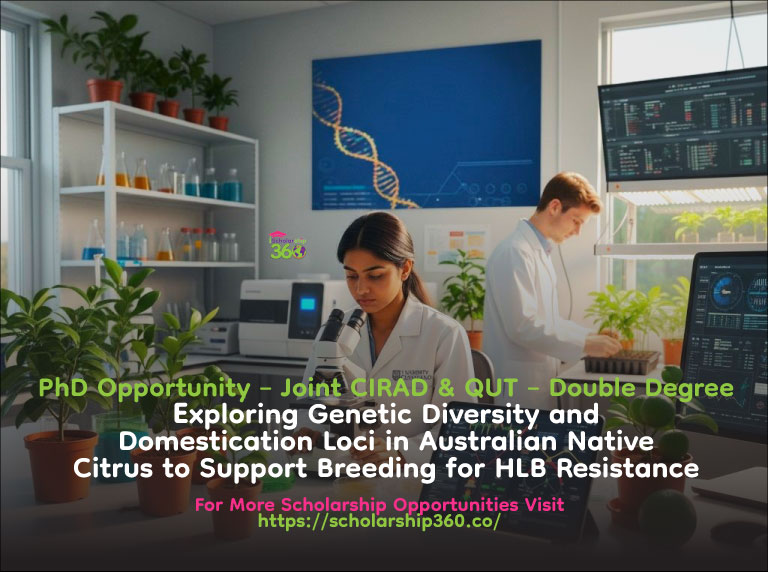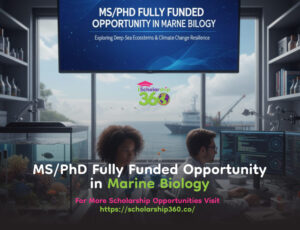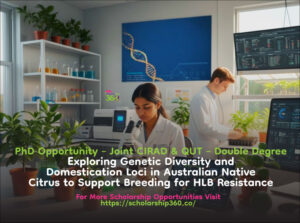Fully Funded PhD – Exploring Genetic Diversity and Domestication Loci in Australian Native Citrus to Support Breeding for HLB Resistance
Citrus is one of the most important fruit crops in the world, but its future is under severe threat from Huanglongbing (HLB), also known as citrus greening disease. Considered the most devastating citrus disease globally, HLB drastically reduces productivity and fruit quality, and eventually kills trees. To date, no curative solution exists. The most promising long-term strategy is the development of citrus varieties that are resistant or tolerant to the disease.
This is where Australian native Citrus species – such as C. glauca, C. australasica, and C. australis – play a vital role. These wild species have shown remarkable resistance or tolerance to HLB. However, their domestication potential and genomic diversity remain largely underexplored. Addressing this gap offers a pathway to developing improved citrus varieties that can secure the sustainability of the industry.
📌 The PhD Opportunity
A unique joint PhD program is now open, led by CIRAD (France) in collaboration with Queensland University of Technology (QUT, Australia). This double-degree program offers a rare chance for a motivated student to work across three international research hubs: Guadeloupe, Montpellier, and Queensland.
Due to Australia’s strict biosecurity regulations, experiments involving HLB will be conducted in Guadeloupe (French West Indies). Meanwhile, genomic studies, domestication trait analysis, and diversity evaluations will be carried out in Australia and France. This ensures a comprehensive research experience that combines both applied and fundamental plant sciences.
🔬 Project Description
The PhD candidate will employ advanced genomic approaches and leverage global research resources to:
-
Map QTLs for HLB resistance and tolerance (in Guadeloupe)
-
Identify domestication genes in wild Oceanian Citrus species (in Australia)
-
Explore haplotypic and genotypic diversity in Citrus breeding materials across continents
-
Assess genomic resources to support breeding programs in both Australia and France
The research design will allow the candidate to contribute to global citrus improvement initiatives by combining phenotyping, genomics, and bioinformatics.
🌍 International Mobility
This program emphasizes international exposure and collaboration. The selected student will spend time at:
-
Guadeloupe – for HLB phenotyping at the start of the thesis
-
Montpellier, France – for bioinformatics, diversity studies, and comparative genomics
-
Queensland, Australia – for domestication trait studies, wild germplasm analysis, and applied genomics
This rotation across three different research environments ensures both scientific expertise and cultural adaptability, preparing the candidate for a global research career.
👩🔬 Supervision and Host Institutions
The student will be jointly enrolled at:
-
Queensland University of Technology (QUT), Australia
-
Université de Montpellier, France
Supervision will be provided by a team of internationally recognized experts:
-
Dr. Peter Prentis (QUT)
-
Dr. Raphaël Morillon (CIRAD)
-
Dr. Bárbara Hufnagel (CIRAD)
Host teams will include the CIRAD SEAPAG Team and the QUT CAB Team, both leaders in plant genetics, breeding, and bioinformatics research.
🎓 Candidate Profile
We are seeking a highly motivated student with:
-
A Master’s degree in Plant Sciences, Genomics, Bioinformatics, or related fields
-
Experience in genetics, bioinformatics, or molecular biology
-
Strong interest in applying genomics to plant breeding and crop improvement
-
Skills in biostatistics and computational analysis (desirable)
-
Fluency in English (required); knowledge of French is a plus
-
Willingness to travel and spend extended research periods in Guadeloupe, Montpellier, and Australia
Personal qualities such as autonomy, teamwork, and adaptability will be considered essential for success in this international program.
📅 Timeline and Funding
-
Start Date: Between November and December 2025
-
Duration: Fully funded for 3 years
-
Funding: Covers tuition, research, and living expenses during the program
📝 Application Process
Deadline: 30 September 2025 (23:59 CEST)
Applicants should prepare the following documents:
-
A Motivation Letter outlining research interests and suitability for the project
-
A Full CV, including academic transcripts
-
Contact information for at least one referee
Applications and inquiries should be sent to:
📩 barbara.hufnagel@cirad.fr
📩 p.prentis@qut.edu.au
More information about the PhD project can be found here.
🌟 Why Apply?
This PhD program is a rare opportunity to:
-
Contribute to solving a global agricultural challenge – HLB resistance in citrus
-
Gain international research experience across three continents
-
Work under the supervision of world-leading experts
-
Develop expertise in genomics, bioinformatics, and breeding
-
Build a professional network within the global citrus research community
By joining this program, you will not only advance your academic career but also contribute directly to safeguarding the future of the citrus industry.
👉 If you are passionate about plant genomics, international research, and tackling one of agriculture’s greatest challenges, this PhD is for you. Apply now and shape the future of citrus breeding.
For More Scholarship Opportunities Visit
https://scholarship360.co/






